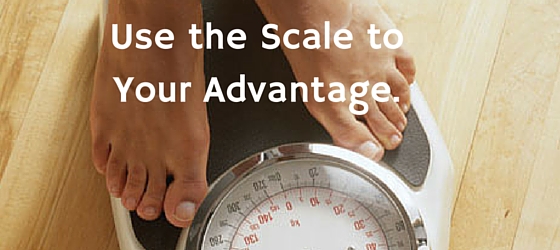I have worked with hundreds of clients over the years and I would say over ninety percent of them have weight loss goals. Most, but not all of them, have a habit of weighing themselves either at home or at the gym. The regularity of this self-weighing, however, varies drastically from one person to the next. A lot of the time they will use our visits as their “weigh-in”. This can be of great advantage to them, because knowing they have an upcoming consult with me produces accountability and jumping on the scale in front of me can provide the motivation they need to stay on track the week before our consult. Anyone who has worked with me knows that I am not the Drill Sargent type, and that weighing is always optional. However, for the most part I am in favor of weighing.
The biggest reason I am in favor of a regular habit of weighing is because it provides a reality check. It is kind of like those electronic signs by the side of the road that show how fast you are driving. You might be cruising along, thinking you are doing just fine, when it starts flashing at you. You look down at your speedometer to see that, yes, the sign is right. And what do you do? Slow down; hopefully. The scale can provide that reality check to show how you are doing with your food and exercise. It can tell you to slow down (eat less) before you get a ticket (gain ten pounds).
One of the keys to being successful in this habit is to do it on a regular basis. The question becomes what is regular? For years I have told my clients to weigh themselves on a weekly basis. And you have probably heard this advice at some point as well. Your body’s weight can vary from day to day, and while we want to think that one-pound loss from the day prior is all fat, the truth is that water fluctuations can have a greater influence on day-to-day measurements. New evidence indicates, however, that daily weighing can be beneficial and improve weight loss results. A study published last year in the Journal of Obesity, tracked 162 overweight women and men, average age of 47, over two years. Those that weighed themselves every day and tracked their results lost more weight and kept it off than those that didn’t. Other research shows that daily weighing is especially helpful in preventing age related weight gain. This article from Consumer Reports, “The Best Time to Weigh Yourself”, gives a great synopsis of this recent research.
Is daily weighing for you? Part of it can depend on your history as well as your general emotional reactions to it. If you have any history of an eating disorder, then you should not weigh daily. Also, if you let the number on the scale determine your emotional state for the rest of the day, then daily weighing probably isn’t for you. Remember, the key is not to give the scale the power. It is just a number to evaluate yourself, and check in on how you are doing. Don’t let the number on the scale ruin your day!
Weighing on a regular basis is not only important for weight loss, but also for weight maintenance. When a client achieves their weight loss goal in my practice, we create a maintenance plan together. Part of that maintenance plan is self-monitoring of their weight. I suggest a 3 – 5-pound weight range that they should set as their maintenance goal. If there is an occasion when they weigh over that goal range, then immediate implementation of a stricter and more focused food and exercise regimen is suggested to drop those excess pounds. Because they monitor themselves on a regular basis, they can employ the change they need to right away, and avoid any drastic weight re-gains.
General rules for weighing include:
- Use the same scale each time you weigh. It doesn’t matter if it isn’t 100% accurate as long as it gives consistent readings.
- Weigh first thing in the morning before you eat. This is typically your lowest weight of the day.
- Weigh yourself naked, or with the same clothing each time to get the most accurate readings.
I would love to hear your thoughts and experience on this topic. Please weigh-in!
And, as always, please share this article with family or friends if you found it helpful.






